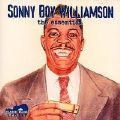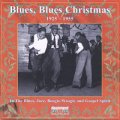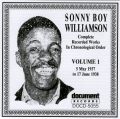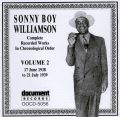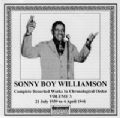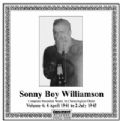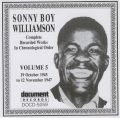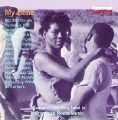"Search Document Records - Sonny Boy Williamson Results "
Viewing 1 to 8 of 8
Sonny Boy Williamson, the essential DOUBLE CD More Info on our New Store >> |
||
Blues, Blues Christmas 1925 - 1955 Various artists
Double album with full colour 20 page booklet by Jeff Harris. Detailed discography The idea of Christmas themed blues and gospel numbers stretches back to the very dawn of the recorded genres. “Hooray for Christmas” exclaims Bessie Smith to kick off her soon to be classic “At The Christmas Ball”, which inaugurated the Christmas blues tradition when it was recorded in November 1925 for Columbia. A year later, circa December 1926, the gospel Christmas tradition was launched when the Elkins-Payne Jubilee Singers recorded “Silent Night, Holy Night” for Paramount Records. After these recordings it was off to the races with numerous Christmas blues numbers recorded by singers of all stripes, a pace that continued as blues evolved into R&B and then rock and roll. Continued... More Info on our New Store >> |
||
Sonny Boy Williamson Vol 1 1937 - 1938 (5th May 1937 to 17th June 1938) Genres: Blues, Blues Harmonica, Chicago Blues, Urban Blues. Informative booklet notes by Keith Briggs. In a brief life of thirty four years Sonny Boy Williamson achieved immortality as the pioneer of what was to become part of the post war electric sound of the Chicago Blues. To allow the harmonica, sometimes described as a 'semi-legitimate' instrument, to compete in a band environment, with drums, usually a piano and recently amplified guitars Sonny Boy literally embraced the microphone along with the harmonica to great effect. Often he would dove-tailing and blend the sound of the instrument with the beginning or end his songs lines. His popularity and influence were immense and survive until today. His techniques paved the way for many blues artists, including Sonny Boy (Rice Miller) Williamson, Little Walter, Junior Wells and many others. This, the first of five remarkable volumes from Document of the complete recordings of the father of amplified blues harmonica, demonstrates how Sonny Boy Williamson 1st brought the instrument from the country to the city and turned the small, pocket sized instrument into a major voice in the blues. More Info on our New Store >> |
||
Sonny Boy Williamson Vol 2 1938 - 1939
Sonny Boy (John Lee) Williamson, vocal, harmonica.
With contributions by: Walter Davis, piano; Yank Rachell, mandolin; Robert (Nighthawk) Lee McCoy, guitar; Speckled Red, piano; Big Bill Broonzy, guitar.
Genres: Chicago blues, Blues harmonica, Urban Blues
Informative booklet notes by Keith Briggs.
From this album's booklet notes:
By 1938 any lingering doubts Bluebird might have had about Sonny Boy Williamson had been laid to rest and they had him in the studio three times that year. Sonny Boy was joined by Big Joe Williams and Yank Rachell during his second session in the studio and it is speculated to be the latter playing guitar on the rather hastily arranged title track My Baby I've Been Your Slave. For the second number Yank Rachell is on his more usual instrument, the Mandolin, to contribute to the crisp backing of Whiskey Headed Blues, a number that has since been given various treatments by artists such as Tommy McClennan and John Lee Hooker. On Shannon Street Sonny Boy describes getting drunk in Jackson and his wife's reaction to the event. Alcohol and Sonny Boy Williamson were not a good mix and he would have increasing problems with it throughout his life. Deep Down In The Ground is built on the base of another song "Stack of Dollars", a song associated with Sleepy John Estes and often performed by Big Joe Williams.
More Info on our New Store >> |
||
Sonny Boy Williamson Vol 3 1939 - 1941 Sonny Boy (John Lee) Williamson, vocal, harmonica. With contributions by: Walter Davis, piano; Big Bill Broonzy, guitar; Blind John Davis, piano; Joshua Altheimer piano and others... Genres: Chicago Blues, Blues Harmonica, Urban Blues Informative booklet notes by keith Briggs. From this album's booklet notes:
The opening eleven tracks on this Document Records Sonny Boy Williamson CD represent the greater part of his only studio appearance in 1939. Sonny Boy was again accompanied by Big Bill Broonzy on guitar and Walter Davis on piano. The first track T.B. Blues is a sombre recording of Victoria Spivey's influential 1929 song. In Good Gal Blues Sonny Boy complains about how much singing he has to do; "Lost my voice, didn't do nothin' but make a lot of noise" registering a mild disapproval at the length of the session but if so he was back on fine form with a report on the heavyweight boxing fight between Joe Louis and John Henry. Other themes explored are the prison inspired tracks New Jail House Blues and Life Time Blues. Big Bill Broonzy again proves his worth on the fast and jivey track Tell Me Baby a song much favoured by blues singers. The session ends with Honey Bee one of two separate songs with this title recorded by Sonny Boy. More Info on our New Store >> |
||
Sonny Boy Williamson Vol 4 1941 - 1945 (4th April 1941 to 2nd July 1945) Sonny Boy (John Lee) Williamson, vocal, harmonica. Informative booklet notes by Keith Briggs. From the date of his first recordings in 1937 (Document DOCD-5055) until his death a decade later Sonny Boy Williamson was the undisputed king of the blues harmonica, at least in Chicago. Although there were plenty of other artists using the instrument only William 'Jazz' Gillum achieved anything like the popularity of the boy from Jackson, Tennessee and even Jazz could never claim the mastery that Sonny Boy underlined with every performance. The period spanned on this Volume encompasses the bulk of World War Two and the infamous ban on recording brought about by James C. Petrillo. Petrillo became president of the Chicago local of the musician's union in 1922, and was president of the American Federation of Musicians from 1940 to 1958. Petrillo dominated the union with absolute authority. His most famous actions were banning all commercial recordings by union members from 1942 - 1944 and again in 1948 to pressure record companies to give better royalty deals to musicians. Although Sonny Boy never commented on this event he was very vocal about the conflict which he saw as a chance for the black American to both prove himself and improve his lot. Continued... More Info on our New Store >> |
||
Sonny Boy Williamson Vol 5 1945 - 1947 DOCD-5059 Sonny Boy Williamson Vol 5 (1945 � 1947) Sonny Boy (John Lee) Sonny Boy (John Lee) Williamson, vocal, harmonica. Genres: Blues, Blues Harmonica, Chicago Blues, Urban Blues. Informative booklet notes by Keith Briggs. Between 1944 and the end of his career (and life) in 1948, Sonny Boy Williamson had gone from strength to strength. He had already made reference in song to his appreciation of artists like Fats Waller and he seemed determinedly updating his sound. More and more of Sonny Boy's recordings featured a solid up tempo beat, often provided by drummers such as Jump Jackson or Judge Riley, and the guitarists and the pianists that he favoured (Willie Lacy, big Bill Broonzy and Blind John Davis - even Big Maceo and the ever adaptable Tampa Red for one session) were also capable of moving with the times, providing jazzier accompaniments to show off Sonny Boy's ever increasing skills on the harmonica. Continued... More Info on our New Store >> |
||
My Babe - Document Shortcuts Volume 3. Blues sampler More Info on our New Store >> |
||

